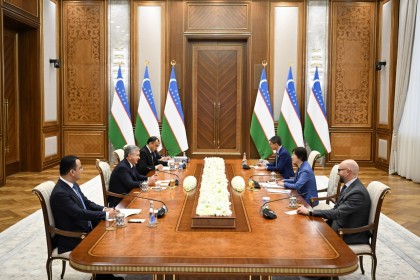Following the adoption of a new country strategy for Uzbekistan, the EBRD is providing funds for the development of sustainable solutions for the municipal and power infrastructure sectors in the country.
Under new agreements, the Bank is extending long-term loans to six infrastructure projects, collectively worth €333 million, which will help improve water supply and district heating services in the capital city, Tashkent, and in the Khorezm and Namangan regions, as well electricity transmission in the Navoi region.
Uzbekistan is home to almost 33 million people, which makes it the most densely populated country in Central Asia. For decades it has been suffering from underinvestment in public utilities such as district heating, water and wastewater infrastructure. Addressing urgent needs as well as long-term challenges, the EBRD has identified infrastructure investments as one of its priorities in the country.
In addition, Uzbekistan has one of the highest energy and carbon intensities in the region. It is also vulnerable to the impacts of climate change and confronted with water shortages. The EBRD-financed projects will help address these issues and contribute to the government’s large-scale municipal investment programme.
The following projects with EBRD funding were signed:
- Tashkent Water: a €26.1 million loan aimed at the rehabilitation of water and wastewater infrastructure in the capital of Uzbekistan. The funds will be used for the construction of a wastewater collector, the supply of equipment for water networks and sewage pumps as well as for the acquisition of machinery and laboratory equipment. The project will increase the number of people with regular access to safe water by almost 400,000.
- Namangan Water: a €52.2 million loan to support the rehabilitation of the water and wastewater infrastructure in the Namangan region. The project also envisages the rehabilitation of water and wastewater networks, pumping stations and the construction of water and wastewater treatment plants. Once implemented, the project will give 280,000 new users access to safe drinking water. It will also help increase the amount of treated water, reduce water losses and secure energy savings.
- Khorezm Water: a €52.2 million loan for the rehabilitation of water and wastewater infrastructure in the Khorezm region. The number of consumers with access to safe water will increase by 200,000 people as a result of the project. It will include the construction of new water intakes, renewal of pumping stations, water and wastewater treatment facilities, and the installation of household and bulk meters.
- Tashkent District Heating: two loans worth €43.5 million and €87 million respectively for the rehabilitation of heat distribution and generation infrastructure in the capital of Uzbekistan. The investment will include the installation of individual heat substations, combined heat and power units, the repair of boilers and heat networks and the upgrade of district heating pumps. Both projects are expected to bring significant energy savings and reduce CO2 emissions.
- UzbekEnergo Muruntau Substation: a €71.7 million loan aimed at increasing the efficiency and reliability of the power transmission system in the Navoi region. The investment will help remove bottlenecks in supplying electricity to local industrial, mining and residential settlements, while reducing transmission losses.











